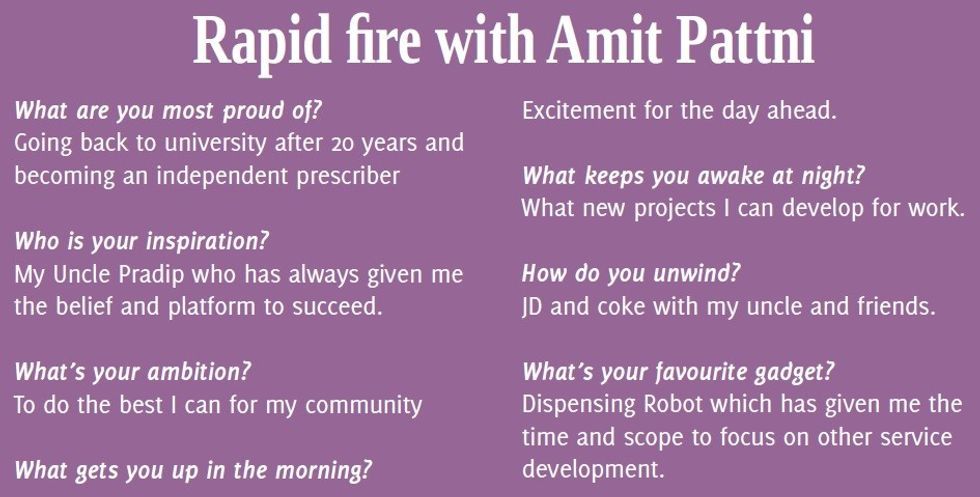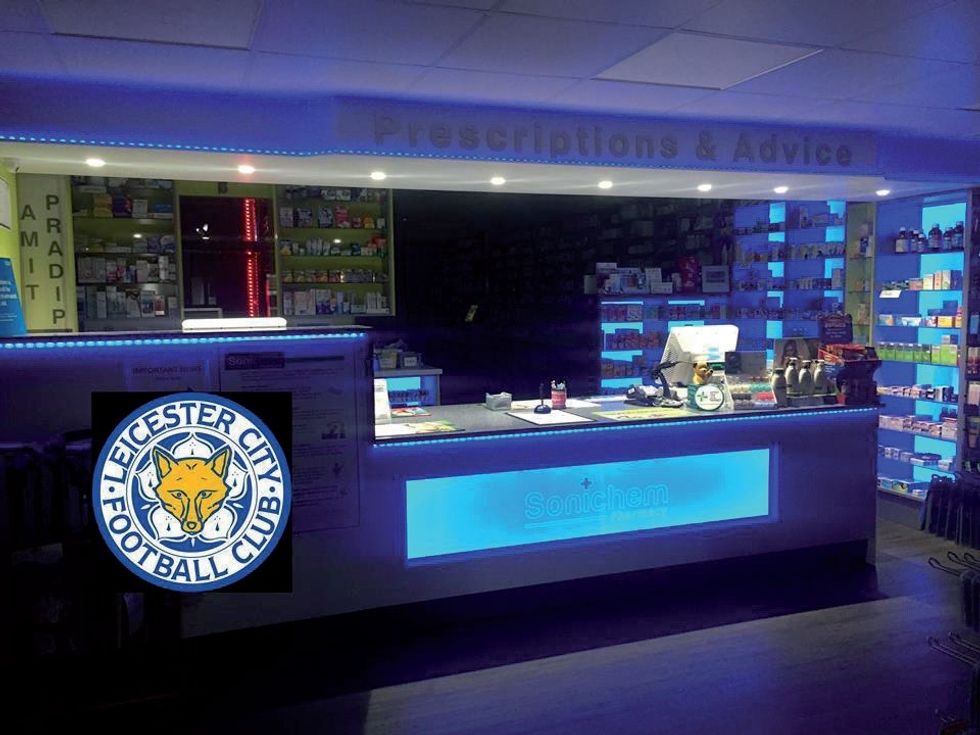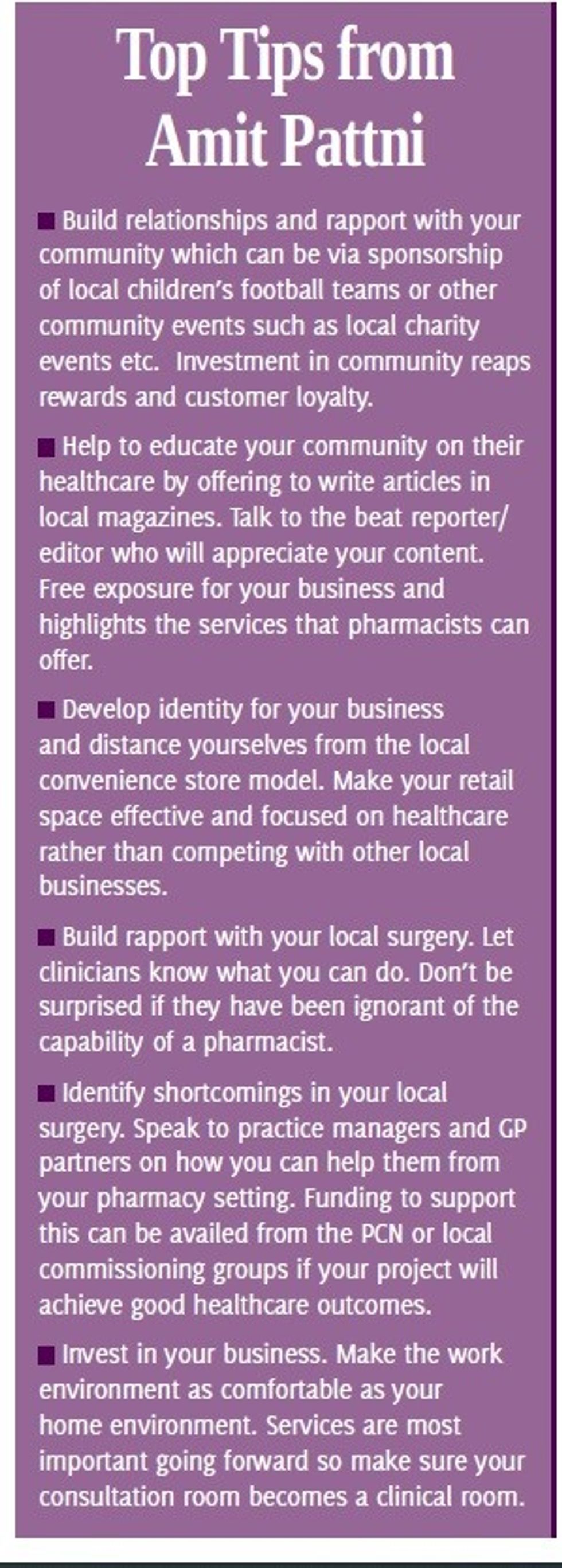Award-winning pharmacist Amit Pattni gives an account of how he teamed up with the surgery next door to deliver some exemplary work which has served as a benchmark for others to follow. He spoke to Priyankur Mandav…
Behind many a success story there is an influential mentor who through their knowledge, expertise and experience encourages the personal and professional development of a mentee.
Amit Pattni found his role model in his community pharmacist uncle; who helped him set his early goals, navigate difficult situations, develop professional skills, and learn the ropes and the tricks of the trade from a very young age.
Uncle Pradip was there to set him up on the right path and give him the right advice. When Amit completed his pharmacy degree at the millennium from the same school as his uncle-De Montfort University in Leicester-he was asked to undergo his pre-registration training in a big company, not in the small independent community pharmacy where Amit spent his entire childhood and teenage years as a brown-eyed Saturday boy.
Uncle Pradip’s reasoning was quite plain: “Go and learn from what the big boys are doing out there. You won’t achieve anything here.”
Amit literally grew up in the pharmacy: he would accompany his uncle and stay there all day every Saturday since he was 8 years old. On weekdays, he would come with his mum, after school, to the family jewellery shop to help his other uncles press bangles and melt gold.
“From a very early age the seeds were sown,” he says, “seeing how my uncles in the jewellery business operated, developing this culture of business which was very much customer orientated. I got a lot of business acumen, subconsciously, just by being there in both the settings.”
There was no silver spoon and it was quickly realised what it took to earn a pound and this excitement is still an influential factor today.
When Amit completed his pre-registration and wanted to work under Uncle Pradip at his Sonichem Pharmacy in Leicester, he was turned down and advised to come back to the pharmacy only after gaining some ‘real world’ experience.
Right advice
“The best thing my uncle ever did,” says Amit. “He sent me out there and I went and worked for the likes of National Co-Op Chemists, Lloyds and Boots- studying how these multinational companies are attracting so many people. I was like a big sponge all the time – absorbing all the information I was getting from them, working seven days a week. It was the right advice at an opportune time.”
When he eventually got asked to start working as a pharmacist at Sonichem Pharmacy circa 2004, Amit had his work cut out-he didn’t know where to start; for there was so much he could draw from having already worked at Co-operative Chemists as their youngest-ever area manager.
But he could see what his “wise and seasoned” uncle meant when he had sent him away to experience ‘the real thing’. He saw why branding was so important for major chains and why customer service was at the heart of their entire company culture and how it played a role in nearly everything they did. He understood why they paid so much attention in store layout and obsessed about attracting new customers whilst running loyalty schemes to retain existing ones.
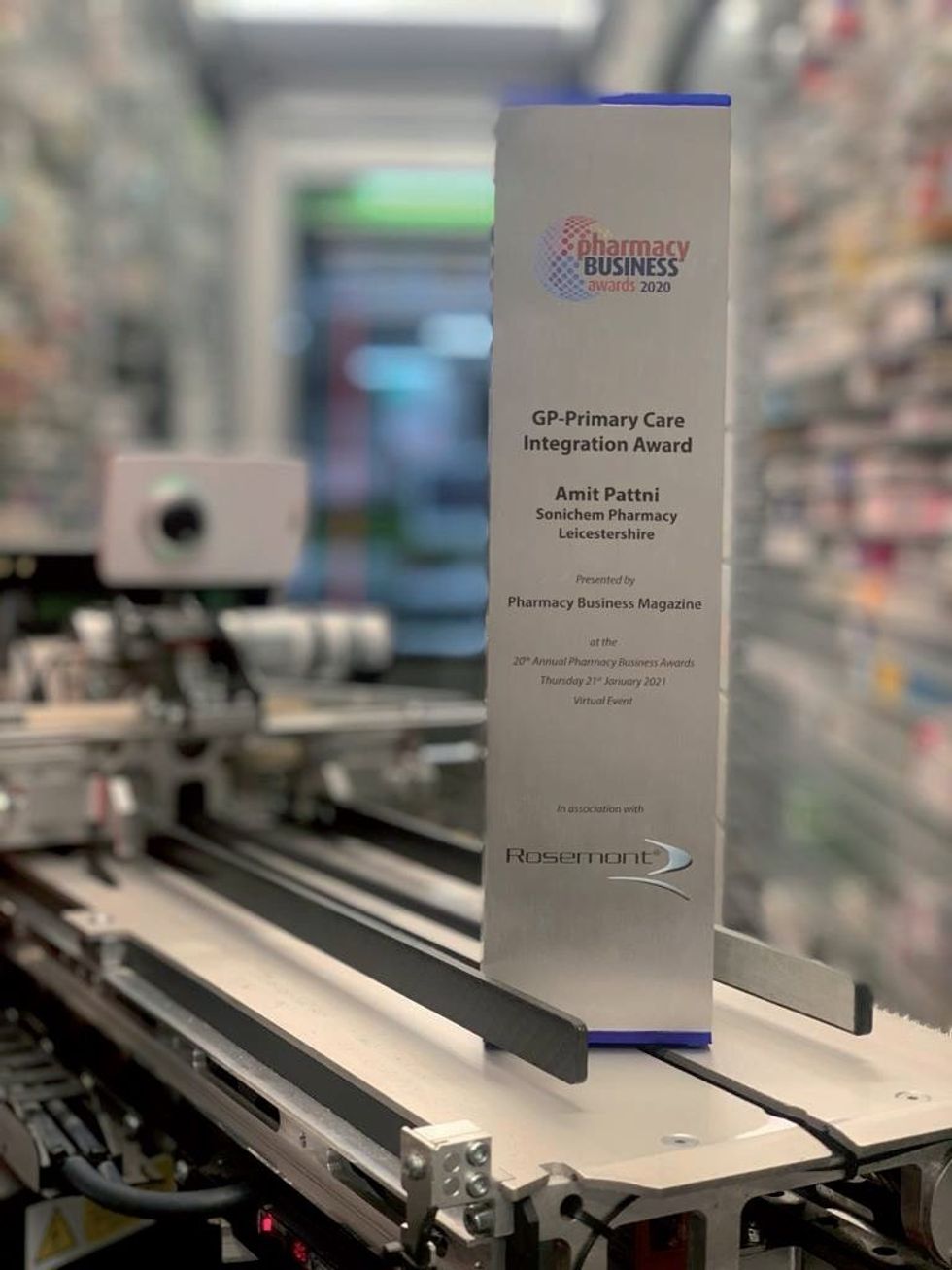
Be that as it may, Amit also realized where his uncle’s small independent pharmacy stood, what set him apart and what clear advantage it had over the big boys of pharmacy. He realised that no large retailer could replicate the customer experience of a little community pharmacy like Sonichem.
“The clue is in the name,” he said. “We operate in a neighbourhood where my uncle knows, like the back of his hand, each of his patients, their extended families, friends and relatives; he has access to their medical records; and he treats them as his friends and family. He has actually engrained himself in that community.”
Novel idea
At Sonichem, Amit wanted to do two things first: renovate the pharmacy and increase its dispensing income which he felt was way too small for a pharmacy that size.
He wanted to create a consultation room where he could utilise his clinical skills “to demonstrate to the NHS” what he was capable of. However, Pradip needed a fair bit of persuading before he would agree to allow his protégé a free run.
It was a time when tins of baked beans were a common commodity in a community pharmacy. Not many contractors would willingly give up on their retail space in favour of a consultation room, although it was beginning to go mainstream in some pharmacy chains.
“We drew up a big plan, renovated the shop and the fi rst thing I did was build a small but very effective consultation room. Back then in 2004-2005, consultation rooms were indeed a very novel idea,” Amit recalled.
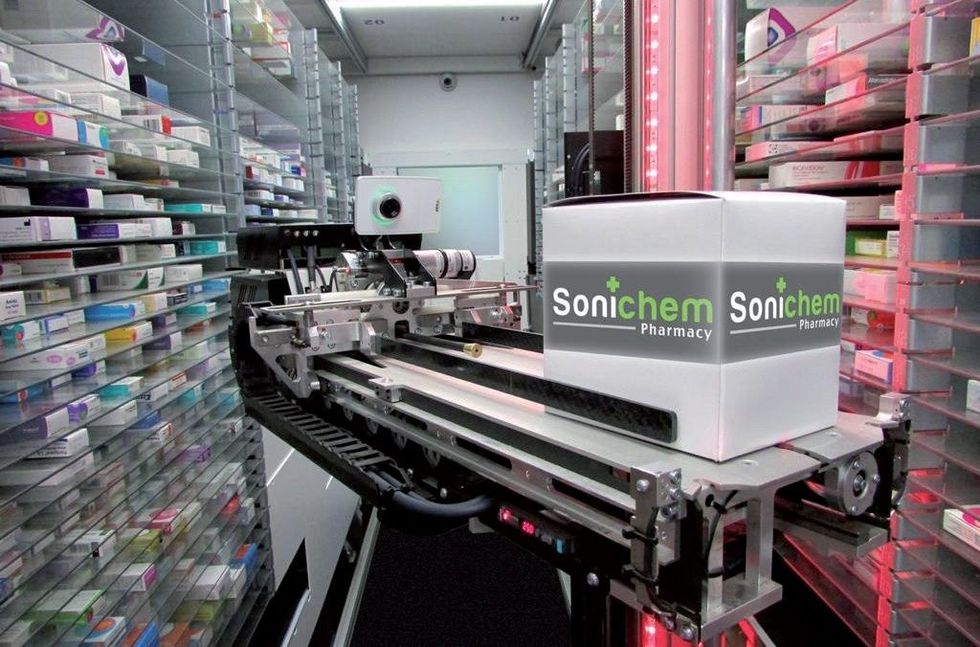
He told his uncle how the room would be very useful “in getting the NHS to look at our facilities and our professionalism”. Amit abominated how independent pharmacy used to be looked down upon as an extension of a corner shop and not as a health clinic run by medical professionals. He wanted that perception of his family-owned pharmacy changed.
A first step towards raising the profile was by building brand identity. He created a Sonichem branded form to promote the pharmacy’s prescription collection service, an idea he picked from his time at the multiples.
“All these people who were previously unaccounted for started to come back in and growth accelerated by the month, which was further boosted by the provision of a secure electronic transfer of prescriptions or ETP. Now we dispense more than 20,000 items a month.”
Collaborative mindset
Central to Amit’s resounding success is his novel thinking and a collaborative mindset. He was already conducting flu vaccinations as well as running private PGDs and NHS services for Kingsway Surgery such as smoking cessation and medication reviews. One day he decided to do something out of the box: he invested in a little machine which would do a finger prick blood test to help predict their risk of developing cardiovascular disease.
The QRISK calculations take into consideration traditional risk factors such as age, blood pressure, smoking status and ratio of total serum cholesterol to high density lipoprotein cholesterol; along with a patient’s body mass index, ethnicity, and measures of deprivation, family history, chronic kidney disease, rheumatoid arthritis, atrial fibrillation, diabetes mellitus, and antihypertensive treatment.

“We charged £10 every time we did this, and I would present the reports to the doctors themselves.”
The GP next door told him: “From this one thing that you’ve done, we have been able to see and triage many of our patient cohorts that we would otherwise have missed out on. This is a huge steppingstone. Because we can’t possibly be able to see the 10,000 patients that we’ve got in our surgery to do this, we’ll keep filtering them on to you.”
Amit’s eyes popped out of his head when the GP told him they would like him to run it as an NHS-funded service in his pharmacy.
“What prompted me to start the service was our demographic. More Asians were moving into the area which was already geared toward the elderly demographic. There was also no real input from the surgery or a public health promotion campaign to help people adopt a healthier lifestyle. I thought we should really do something to identify and diagnose these risks to their lives.”
For Amit, a QRISK was really to try and educate people by giving then a kick start to say, ‘do something now’. But it was also a lesson for him to understand that not everyone would know what pharmacists can do beyond the perception that they are pill packers.
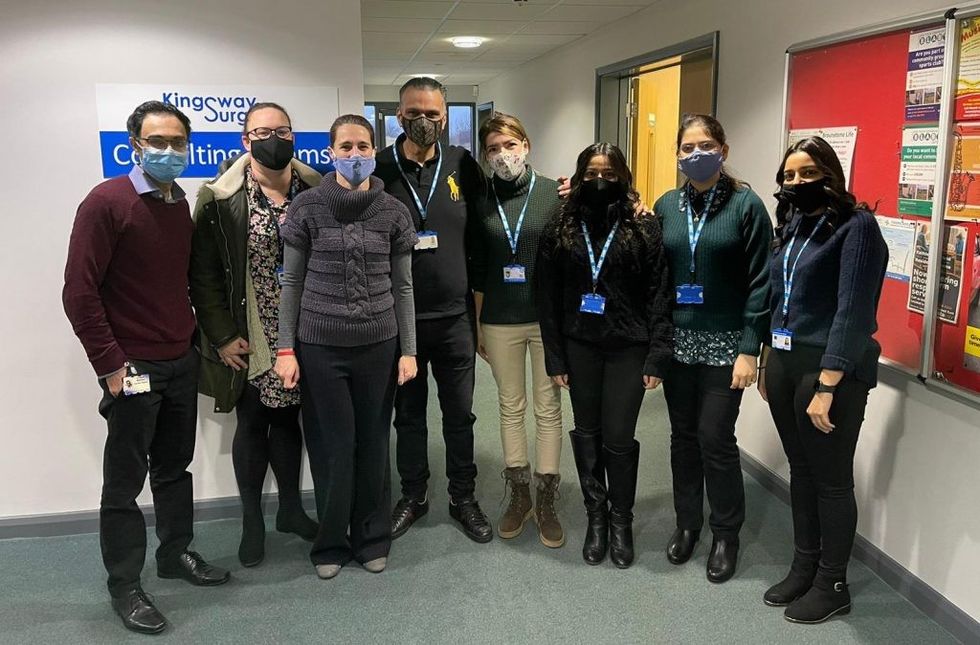
“We got more and more noticed. We already had a good rapport with the surgery, but this took the relationship on to a different level.”
Before the pandemic, Amit started a phlebotomy clinic to help support the review process and facilitate blood tests that could not be accommodated in surgery due to restrictions. A four-hour clinic generates circa £80 per day.
“The surgery funds all equipment and supplies and pays for consultation room hire with staff costs,” he said.
Similarly, always ahead of the curve, Amit started a mental health clinic in January 2020 after gaining his independent prescriber qualification and chose his scope of practice to be in anxiety and depressive disorders. That was because the surgery was not performing well in this area and he thought his role would be invaluable to them.
“The service provided patients with someone to talk to as a safety net or security and book an appointment whenever they need. Currently no patients have had any further ill consequences as an outcome of these consultations.”
The clinic which was originally set up to run only once a week became one that would operate for four days and eight sessions a week. “As the surgery’s QoF improved to excellence so did my remuneration,” says Amit.
During the pandemic, Kingsway integrated some of their services with those of Sonichem to offer better practice resilience to the patient cohort. Amit has been instrumental in the setting up of their blood clinic and the minor illness clinic to support the surgery’s patient base.
The two businesses have joined forces to set up a joint Covid vaccination clinic in which Amit is the lead vaccinator. Recently they delivered 887 doses of Pfizer’s Covid-19 vaccine in a single session, creating a record for the local Primary Care Network.
Goals have been met at all steps, Pradip can now relax in the pharmacy as Amit and the team he has developed handle the day to day business at the pharmacy. One of the main ambitions achieved is the perception of pharmacists to other clinicians and patients. His GP colleagues view Amit as their equal and will often refer to him with any queries they have.
Sonichem was the first community pharmacy in Leicestershire to automate dispensary operations with the robot in 2015. It has been refreshing to see where they have pioneered that others now follow and have the foresight and dynamism to develop their business models to adapt in an ever-changing pharmacy world.
Amit admittedly owes a great deal of gratitude to his mentor, whose favourite quote is always remembered: “Success comes before work only in the dictionary.”




